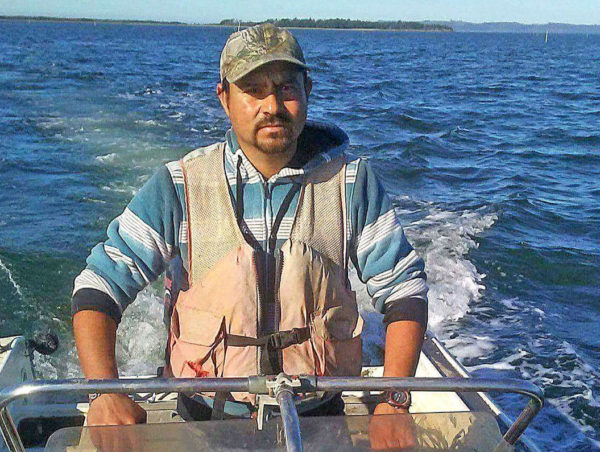ICE Is Using Driver’s License Applications To Arrest Immigrants
More states are giving undocumented immigrants driver’s licenses, but many DMVs are sharing their information with ICE.

One day in June 2017, Gladys Díaz got an unusual call from a stranger. At the time, Díaz and her partner, Baltazar Aburto Gutiérrez, were living in Ocean Park, a town of about 1,800 people on the Pacific coast of Washington State. Both were undocumented Mexican immigrants. Aburto Gutiérrez worked for a seafood company, harvesting clams in tidal mud flats. He and Díaz were raising three daughters.
The girls had started making piñatas with Díaz, who was selling them online. The caller said he wanted one and asked Díaz to bring some piñatas to a parking lot. Aburto Gutiérrez was suspicious, but Díaz went anyway. The caller turned out to be an ICE agent. He arrested her and she was deported to her hometown, near Puerto Vallarta, in Mexico.
In November 2017, the Seattle Times interviewed Aburto Gutiérrez about the piñata sting’s trauma to the family. Days later he, too, was arrested. He recalled the ICE agent explaining that “My supervisor asked me to come find you because of what appeared in the newspaper.”
To arrest Aburto Gutiérrez, ICE enlisted help from an unexpected agency: Washington’s Department of Licensing (DOL). The state allows people to use foreign passports and birth certificates to apply for a driver’s license, and Aburto Gutierrez had submitted his Mexican birth certificate. The DOL communicated this fact to ICE, who cited it as their probable cause. After Aburto Gutiérrez’s arrest, the Seattle Times discovered that ICE was regularly working with the DOL to arrest undocumented people in northwest Washington.
Driver’s license bureau cooperation with ICE goes beyond Washington. Additional investigations by immigrants’ rights organizations and government agencies, including the Vermont Human Rights Commission, have revealed that drivers license bureaus in other states have shared information that ICE has used to arrest people for alleged violations of immigration law. Advocates are now pushing back against the practice, even as they work to increase the number of states that let undocumented immigrants drive.
Driving legally — and facing backlash
As recently as the 1990s, immigration status was not an issue when someone applied for a driver’s license. But in 1996, the Clinton administration enacted an immigration reform law which allowed states to deny licenses to people who were undocumented. Soon undocumented immigrant drivers without licenses, particularly in heavily automobile-dependent areas, were living in terror of being stopped and turned over to ICE and Border Patrol.
But by 2013, legislators in some states were responding to data showing that allowing undocumented immigrants to drive legally not only prevents deportations, but also improves road safety, lowers car insurance costs, and boosts local economies as travel to school and work gets easier. Today 12 states, Washington D.C., and Puerto Rico allow undocumented immigrants to get drivers licenses.
But motor vehicle department sharing of undocumented immigrants’ driver’s license data with ICE has enabled ICE to apparently retaliate against people who have criticized the agency, like Aburto Gutiérrez. The sharing has also led to the arrest of people who have never spoken out publicly against ICE. Two lawsuits have recently been filed to address both of these issues—one in Washington state and the other in Vermont.

After Aburto Gutiérrez’s arrest in Washington in late 2017, outspoken immigrants’ rights activist Maru Mora Villalpando received a letter telling her that she was deportable. Mora Villalpando is from Mexico and is well-known in Washington for her work supporting hunger strikers at ICE’s detention center in Tacoma. She later learned that ICE had gotten her address from the DOL.
Following media attention to Mora Villalpando’s and Aburto Gutiérrez’s cases, Washington Governor Jay Inslee in January ordered the DOL to stop helping ICE with immigration investigations, and the DOL’s director resigned in June, citing family reasons. Months later, in October, three immigrants’ rights organizations sued the Department of Homeland Security and ICE, accusing them of violating the free speech rights of immigrants and immigrants’ rights groups.
Flouting privacy protections
A similar suit was filed in November in Vermont. That state introduced a driving permit in 2014 whose application does not require a U.S. passport, birth certificate, or social security card. But within months after the permit became available, employees at Vermont’s Department of Motor Vehicles (DMV) were sharing information with Border Patrol and ICE about people with foreign-sounding names, according to documents that Migrant Justice, a Vermont immigrants’ rights group, received after filing an open records request. The DMV suspected them of living outside the state and fraudulently requesting Vermont licenses, but ICE often used the data to make arrests for immigration violations.
Vermont’s Human Rights Commission investigated, and in 2016 the DMV was prohibited from giving information to ICE without a subpoena or evidence of a criminal investigation. Yet the sharing continued.
Migrant Justice has organized Vermont dairy workers to improve pay and working conditions and pay on farms and from the state’s storied ice cream company, Ben & Jerry’s. The organization is loudly critical of ICE. It is also politically influential. In 2017, Vermont’s attorney general appointed Migrant Justice leader Enrique “Kike” Balcazar Sanchez to his Immigration Task Force.
ICE by then had started asking the DMV for data from Migrant Justice Center members’ license applications. The DMV complied, and someone in the office wrote on Balcazar Sanchez’ application: “UNDOCUMENTED.” ICE arrested him in March 2017.
The National Immigration Law Center, or NILC, is a Los Angeles-based advocacy group that supports driver’s licenses for undocumented people. The NILC recommends that state motor-vehicle departments receive court orders or subpoenas before sharing information with ICE for criminal investigations; and they should refuse to assist with immigration investigations. NILC attorney Tanya Broder told The Appeal that it’s important to promote these protections for immigrants, because several more states may soon allow undocumented people to get licenses, including New Jersey, New York, Minnesota, Michigan, and Rhode Island.
The current lawsuit filed in Washington against ICE and homeland security discusses the arrest of immigrant clam digger Baltazar Aburta Gutiérrez. But by the time the case is decided, he may be gone from the country. He was released on bond from immigration detention in January, and his attorney, Stephen Robbins, told The Appeal that he is scheduled for an immigration court hearing in 2021. In the meantime he still lives in Washington, near the Pacific coast. His deported partner, piñata maker Gladys Díaz, is with the couple’s daughters. They also live near the Pacific now—but in Mexico, almost 3,000 miles away.
